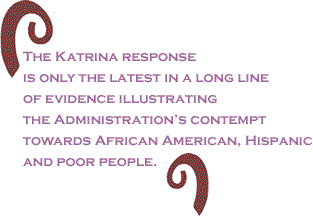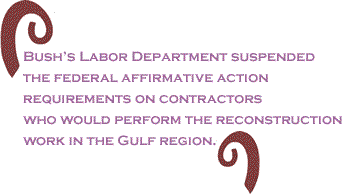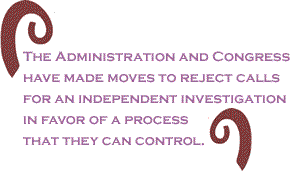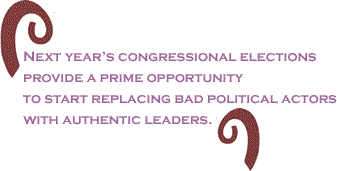
|
|||||||||||||||||||||
|
“Vote or Die!” was the provocative imperative Hip Hop impresario Sean “Diddy” Combs issued to young would-be voters during the 2004 presidential election cycle. At the time, some ridiculed Combs for sensationalism but now the slogan seems more like a haunting foreshadowing of things that would come. Today as the human toll continues to rise in the Gulf Coast region we must reflect on the debacle and how American voting behavior added to the death and devastation in the aftermath of Hurricane Katrina. In Louisiana the poorly executed evacuation, the slow deployment of national guards, FEMA’s uncoordinated and ineffective efforts, and the retarded deployment of additional federal resources showed that there was a clear failure of performance at every level of government. The actions and inactions of our elected officials resulted in a series of mistakes and missed opportunities that caused more lives to be lost unnecessarily.
Now pundits and commentators are looking for someone to hold accountable but no one is pointing the finger at those Americans all too willing to brush off the importance of politics, stay at home on election day, make ill-informed decisions, and/or allow themselves to be influenced by superficial matters that distract from basic issues like whether a candidate is qualified for the position. Political Karma The political process (and the public policies it engenders) is one of the most important vehicles through which people can be empowered to make a positive difference. Yet, a decline in voting participation (except in the case of the 2004 elections) and other civic activities suggests that there is a prevailing misunderstanding across the nation about the role of politics, policy and government and our obligations as citizens in a republic. This indifference has been facilitated by decades of divestment in civic education, growing distaste for the seedier elements of the political process and disillusionment with the paradox of racism and classism in U.S. “democracy.”
Now many are asking how a tragedy like this could happen on U.S. soil. It can happen when citizens from all walks of life devalue their role in shaping a government that determines who will make our laws, manage our public services, and spend our taxpayer dollars. The reality is that politics is serious business. You get who you vote for (or who others voted for if you didn’t vote, or who the Supreme Court gives you when the vote is narrow enough to steal). If you vote for incompetent people, you will get incompetent leadership. In the aftermath of Katrina, it should be clear to all that politicians and politics can literally mean the difference between life and death. Therefore, we tune out or turn our backs on politics at our own peril – for the next life to be sacrificed by incompetence may be your own. Government on Life Support Perhaps Americans can be forgiven their shock over the Bush Administration’s initial callous disregard for Katrina survivors, but there should be no surprise now or in the coming months when evidence of further dysfunction appears. For the Katrina response is only the latest in a long line of evidence illustrating the Administration’s contempt towards African American, Hispanic and poor people and its mismanagement of the U.S. economy. If we take the 2004 election results at face value, it appears that a majority of voters were able to brush off the horrified cries of progressives who objected to the Administration’s gutting of vital safety net programs even while they gave away billions of the taxpayers money to individuals and corporations richer than Croesus. If it didn’t sink in that these tax cuts were a transfer of wealth away from the poor and middle class to the wealthy, then a focus on what the Administration cut in order to cover the hole they made in the federal treasury could provide more understanding.
Just like the poor can’t afford cars to carry them out of harms way in a hurricane, they also can’t afford health insurance, housing, food or life/disability insurance. Federal and state programs such as Medicaid, Section 8 housing vouchers, Food Stamps, TANF/welfare and (for those who earn it) Social Security have historically been in place to provide vital assistance to low income families trying to make ends meet. Yet when Katrina hit, the Bush Administration was in the process of dismantling or undermining each of these important programs. Calling for policy proposals such as small/minority business tax breaks, homeownership opportunities for renters, and lump sum cash unemployment assistance for displaced workers, the President now purports to offer a recovery package targeting aid toward people of color and the poor. Several elements of the President’s proposal are appropriate for assisting low income evacuees, such as the Urban Homesteading Act that will set aside surplus federally-owned property for low-income families who can then build or rehab homes. Other elements, however, illustrate more evidence of class and race bias. Consider, for example, the President’s suspension of the 1931 Davis Bacon Act which calls for construction workers to be paid prevailing wages (the going rate in any given area). This policy will have the effect of padding the profits of reconstruction firms like Halliburton, Bechtel, and Shaw Group, Inc. while undercutting an average worker’s ability to earn a fair wage for a days work. Similarly, a recently released Congressional Research Service report points out that tax breaks offered to provide enhanced economic benefits for evacuees – such as early, no-penalty access to retirement account savings and property tax write offs for destroyed homes – will do more to benefit higher income individuals (since many of the low income do not own 401Ks or homes). Despite the President’s attempt to appeal to African Americans, who were disproportionately and negatively impacted by Katrina, a recent decision (dated Sept. 9) by his Labor Department suspended the federal affirmative action requirements on contractors who would perform the reconstruction work in the Gulf region. While the Administration claims this is a temporary measure to make it easier for companies to participate in the rebuilding, the promotion and extension of this proposal sets a dangerous precedent that could lay the groundwork for undermining the entire affirmative action program. In actuality, this action represents a double slap in the face for African Americans by giving contractors license to pass over blacks in the Gulf reconstruction hiring and setting the stage to give all U.S. employers this option in the future.
Finally despite the surface appeal of the President’s carefully scripted Katrina relief speech last week, the viability of his proposals to help survivors and rebuild the Gulf Coast is in serious doubt given his refusal to consider raising taxes as a way to pay for them. Disagreement among Republican Party leaders in the House and Senate about whether to abandon their plans to make permanent the Administration’s ill-advised tax cuts, promises to further erode financial support for the relief package. Of course, the Administration and Congress can always continue to take the easy way out by borrowing even more money from foreign governments to finance the reconstruction effort while keeping policy peccadillo’s like the Iraq War and tax cuts for the wealthy afloat. Many economists agree, however, that this approach will add substantially to the already massive federal deficit currently strangling the U.S. government and promises to suffocate future generations of Americans who will have to repay the debt. Organization, Not Apathy, is Key When the going gets rough, many want to criticize but few want to act and even fewer want the inconvenience of having to remember what happened at the Superdome and Convention Center in New Orleans. But act and remember we must, for what happens (or doesn’t happen) next may determine the fate of hundreds of thousands of evacuees and perhaps the future of black America.
The evidence is clear that there was gross negligence in the handling of the New Orleans evacuation at the local, state, and federal levels. Already there are claims of a cover up with experts at Louisiana State University’s Hurricane Center refuting the Army Corp of Engineers claims about how and why the levees failed. Pointing to evidence that surge levels from Katrina were not high enough to overtop the levees as the Army Corp of Engineers have claimed, Louisiana State experts say that failure in the levee design and/or construction was the most likely reason why the levees were breached. A rigorous and independent investigation could bring further clarity to where the failures occurred and who may be liable for the lives and property lost. But the Administration and Congress have made moves to reject calls for an independent investigation in favor of a process that they can control. In this climate it will be incumbent upon an organized lobbying force to stay on top of policymakers to make sure that they conduct a thorough investigation, make public the results, hold those responsible accountable, and enact appropriate compensatory measures for evacuees. It is important to remember that even after 9/11, the Administration was loath to launch a proper investigation into what occurred until the families impacted by 9/11 organized to pressure government to do the right thing. Now, it is imperative that the “Katrina Families” be organized into a lobbying force that will ensure that their voices are heard and incorporated into policy discussions on Capitol Hill and in the media when the investigation details are being discussed and reconstruction plans finalized. Conclusion
The United States of America is in a mess. Our basic systems have been proven ineffective and our leaders callous and corrupt. Ironically, it is the U.S. that regularly demands that developing nations focus on adopting good governance policies. Yet, Katrina has made it clear that this critical democratic principle has been abandoned here at home. Americans should see the Hurricane Katrina debacle as a wake up call to commit to producing better leaders and increasing civic participation in its various forms. A different kind of politic – one that is informed, compassionate, and committed to truth and justice – will be required to restore public confidence in good governance. Americans should remember in the upcoming months that while it is necessary to donate money and time to help hurricane victims, it is also necessary to carry this spirit of activism to the political realm. Next year’s congressional elections provide a prime opportunity to start replacing bad political actors with authentic leaders who possess the integrity, qualifications, and compassion needed to make competent, informed policy decisions that will benefit all Americans. Dr. Maya Rockeymoore is an adjunct professor at American University and author of The Political Action Handbook: A How To Guide for the Hip Hop Generation. Maya can be reached at [email protected]. |
Your comments are always welcome. Visit the Contact Us page to send e-Mail or Feedback or Click here to send e-Mail to [email protected] e-Mail re-print notice
If you send us an e-Mail message we may publish all or part of it, unless you tell us it is not for publication. You may also request that we withhold your name. Thank you very much for your readership. |
| September 22 2005 Issue 151 |
|||||||||
|
|||||||||
|
|
|||||||||
| Printer Friendly Version in PDF format. Download free Adobe Reader. | |||||||||
 |
|||||||||
 |
|||||||||
| |
|||||||||
| |
|||||||||































